2016-12-09
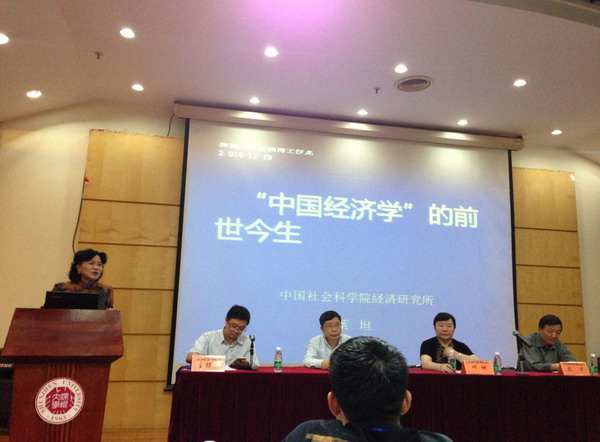
CCSEZR Prof. Tao Yitao delivers a welcome speech
Prof. Tao Yitao on behalf of the theoretical economics faculty of SZU, expressed her appreciation for Prof. Ye Tan, Prof. Zou Jinwen, and Prof. Qian Jin to deliver special academic lectures at SZU in her welcome speech with a hope that the lectures would enlighten the minds of teachers and students present at the salon on the research approaches and practice of economic and social history.
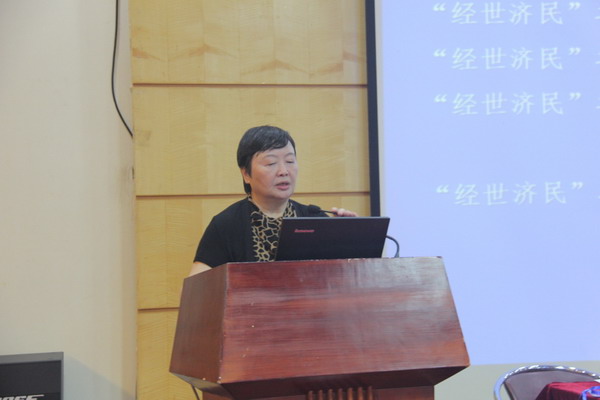
Prof. Ye Tan delivers an impressive report titled The Past And Present of “China Economics”
Prof. Ye Tan delivered an impressive report titled The Past And Present of “China Economics”. She first explained the five essential components of the traditional philosophy of “Governing and benefitting the people”, including academic titles, philological foundation, analytical theses, scope of academic soundness, and institutional practices. Next she analyzed the “Spread of Western Learning to the East” and the introduction of western economics, including the translation of western economic books, economics courses, transition of economic media and academic institutions, and government system transformation. She then noted that China’s economic academics are characterized by the “confluence of the orient and the occident”, which can be seen from the economic works by Chinese nationals and modern agricultural academic works pioneered by Luo Zhenyu. Prof. Ye Tan believed that there are six factors contributing to the academic transformation of Chinese economics: first, the demand of China’s defense against foreign invasions and ascendance to power through reforms at the time; second, the impact of western’s booming growth on China’s modernization; third, the reflection of China’s socio-economic system transition on academics; fourth, the shift of the study on the academic history of the “endogenous” traditional economics into a new stage; fifth, the introduction of western economics and its absorbing and innovation in China ; sixth, China’s march into the modern academic transformation.
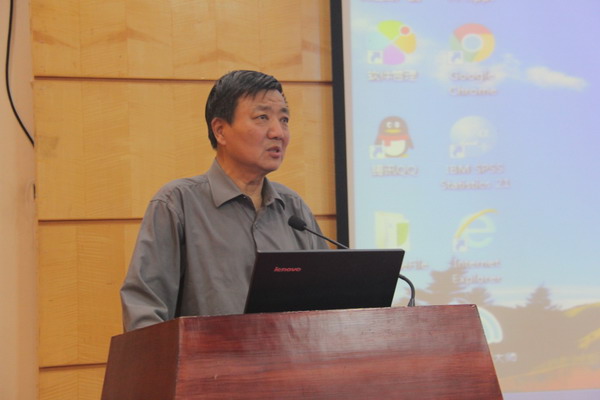
Prof. Qian Jin presents an excellent report titled The Basic Requirements for China’s Economic Reform and Development
Prof. Qian Jin presented an excellent report titled The Basic Requirements for China’s Economic Reform and Development. His report was centered on two topics, namely, basic requirements for reform and development. Later, he indicated that a public enterprise differs from a state-owned one in the following six aspects: first, nature – a state-owned enterprise is a publicly owned enterprise of socialistic nature while a public enterprise is a governmental enterprise; second, production mode – the means of production and labor power in a state-owned enterprise are in direct contact while those in a public enterprise are in indirect contact; third, operation field – a state-owned enterprise can only operate in competitive fields, primarily underlying industry and resource industry while a public enterprise in non-competitive fields; fourth, management method – government functions are separated from enterprise management after reforms of state-owned enterprises, but in a public enterprise, government functions and enterprise management are integrated; fifth, ownership – a state-owned enterprise is owned by the state with governments at different levels acting on its behalf while a public enterprise is owned by governments at different levels; sixth, purpose of establishment – a state-owned enterprise is founded to consolidate socialist economic foundations while a public enterprise is set up by the government to regulate and control national economy through direct investment.
Prof. Qian suggested that development involves two basic requirements, namely, the modernization of agriculture and new industries. Agricultural modernization can be boosted by nurturing new-type farmers, encouraging them to build new type farms, and providing them with technical support. Industry, however, will follow its own course of development. Breakneck industrial growth is inevitably accompanied by slowdown, so it is unnecessary to give too much spotlight to the growth deceleration.
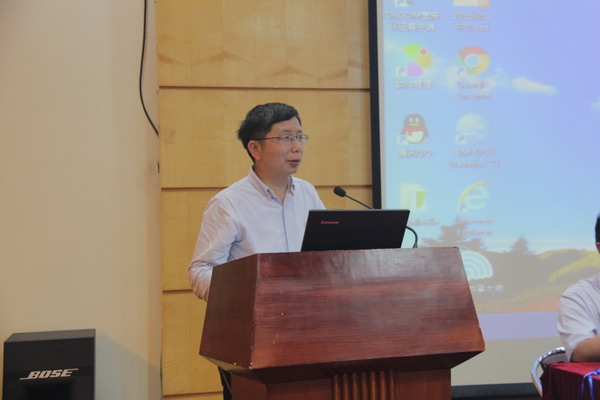
Prof. Zou Jinwen gives a fantastic report titled the Research on the History Of Economic Thoughts of Modern China From an International Perspective
Prof. Zou Jinwen gave a fantastic report titled the Research on the History Of Economic Thoughts of Modern China From an International Perspective. He suggested that modern capitalism expands globally along with capitalist economic thought, which prompts the transformation in China’s economic thoughts despite the geographic features and strong independence of economic thoughts. For this reason, an international perspective should be adopted on the research of the economic thoughts of the Republic of China, which can be realized from the following aspects. First, works on China’s economic thoughts by two major types of western scholars. One of them is the research on China’s economic thoughts by sinologists, such as The Economic History of China, with Special Reference to Agriculture by Mabel Ping-Hua Lee (Columbia University, 1921), the other one is western economists’ review on China, such as the book review on Chen Huan-Chang’s The Economic Principles of Confucius and His School by British economist Keynes published in 1912 on The Economic Journal in the UK and by Edward Alswarth Ross from the University of Wisconsin published on the American Economic Review during the same year. Second, the significant influences of the economic thoughts of Modern China on western economic theories and policies. First, their influence on western economic policies or systems, such as The Economic Principles of Confucius and His School by Chen Huan-Chang. In this book, the author discussed the great influence of the “ever-normal granary” system on the U.S. grain storage system. Second, their influence on western economic theories, such as the Accountants' Handbook (1933) by the celebrated American accounting expert W. A. Paton. In Section 14 of this book on “Intangible assets”, Paton took in the research findings on goodwill in the doctor's dissertation Goodwill and Other Intangibles (University of Michigan, 1926) by Dr. J. M Yang and gave multi-level introductions to intangible assets and goodwill centering on Dr. Yang’s ideas. Third, the international factors of the economic thoughts of modern China. For instance, a student who studies in the UK is influenced by economic liberalism and similarly a student who studies in German by the thought of Economic Intervention.
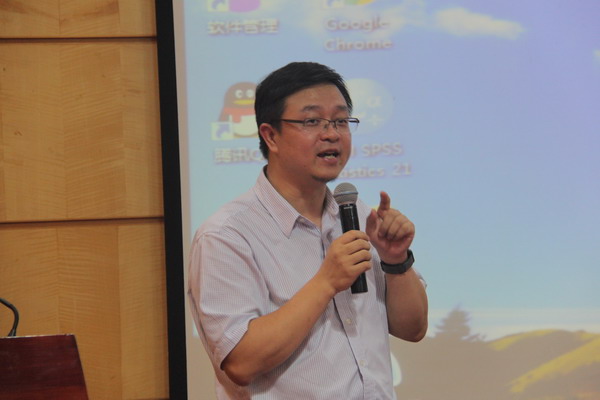
Prof. Zhong Ruoyu, assistant director at CCSEZR, presides over the salon and makes a sum-up
During the discussion session, the teachers and students present at the seminar proactively interacted with three renowned scholars by raising questions and exchanging ideas, especially on the topics such as doctoral dissertation writing, economics research methods, land property right system, and farmer fostering. The professors patiently answered all of the questions and students gained a lot from this interaction.
In his sum-up, Prof. Zhong Ruoyu noted that the great masters we had here today not only fully exemplified the rigorous and meticulous attitude towards scholarship in the research of history and economics and their great demeanor, but also revealed insights into the research methods for China’s economic thoughts. The question “Do foreign thoughts root without soil?” raised by Prof. Ye Tan at the beginning of her report revealed her extensive digging into valuable literature and history materials on the economic thoughts of modern China that has drawn rare attention. Prof. Zou pointed out that theoretical economics cannot exist without historiography and the history of thoughts. Prof. Qian focused on land system and industrial development, and uncovered some major realistic problems facing contemporary China. Theories are not in a grey zone and the history of thoughts is not all dull and dry. In all, we have tremendously benefitted from the lectures by the three academic masters.
(Correspondent: Zhang Chao)
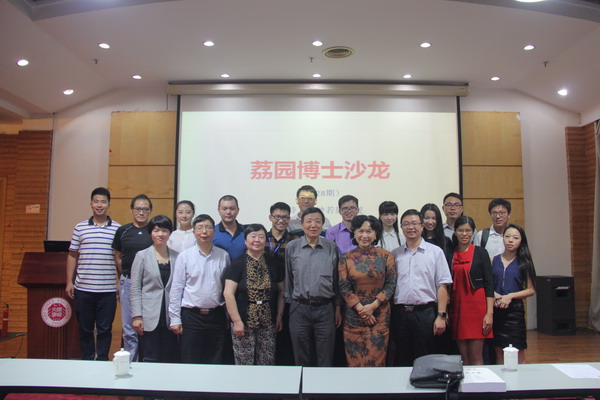
Some of the teachers and students present at the 28th Academic Salon for Ph.D. Students in Theoretical Economics